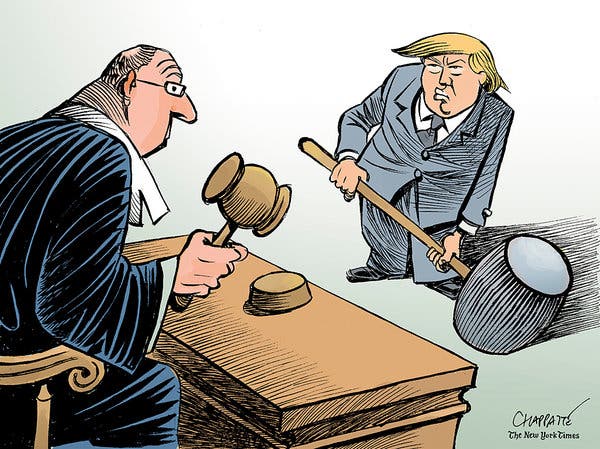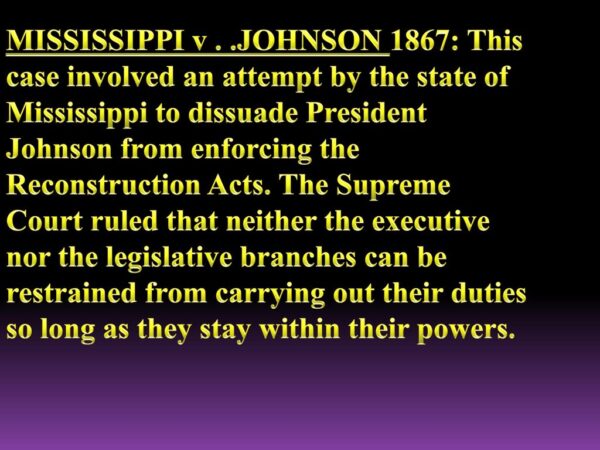By Harold Pease, Ph. D.
In Donald Trump’s first term in office he was impeached twice but not acquitted in either for lack of evidence. When he announced an intended run for a second term he immediately faced, and subsequently beat, four new, separate and fake indictments, some with gag orders to keep him from defending himself and from campaigning effectively while running. We called this lawfare.

Now an army of low level Deep State activist district judges have stepped in front of SCOTUS to destroy Trump’s second term. They, once again, have weaponized the judiciary against him. In the first two months of this term he is facing 125 legal challenges. In his first term it was just 65 in four years (X22 Reports, March 13, 2025, 32:42). They are blocking everything. The Trump DOJ is inundated, every day with lawsuits filed by Deep State activists judges. This is way beyond the pale and the people know this and support Trump.
This is not the first time federal judges have attempted to manage executive branch authority unto themselves. The issue of federal judges having power to interfere with the Executive branch of government was specifically denied them and settled in The State of Mississippi vs. Johnson in 1867. “The President of the United States cannot be restrained by injunction from carrying into effect an act of Congress alleged to be unconstitutional, nor will a bill having such a purpose be allowed to be filed.” (71 U.S. 475 April 15, 1867).
The first suit brought to the Supreme Court against a president of the United States was Mississippi vs Johnson and it was over this very issue. In it Mississippi was contending that Andrew Johnson had exceeded his executive authority by enforcing the Reconstruction Acts, recently passed by Congress. Johnson’s veto was subsequently overridden by Congress. It was to Johnson’s credit that he then felt duty bound to administer it as required of his presidency. “In an attempt to delay or prevent Reconstruction, the state of Mississippi appealed directly to the Supreme Court. Mississippi asked the Court for an injunction preventing the President from enforcing the Acts on the ground that they were unconstitutional.”
The question was, “Could the Supreme Court constitutionally issue an injunction directed against the President?…In a unanimous decision, the Court held that it had ‘no jurisdiction of a bill to enjoin the President in the performance of his official duties’….The Court held that the duties of the President as required by the Reconstruction Acts were ‘in no sense ministerial,’ and that a judicial attempt to interfere with the performance of such duties would be ‘an absurd and excessive extravagance.’ The Court noted that if the President chose to ignore the injunction, the judiciary would be unable to enforce the order” (Oyez LIII Supreme Court Resources, Justia Supreme Court Center Mississippi vs Johnson). Sound familiar?
The last part of the unanimous Supreme Court’s ruling is instructive. If the highest judicial authority in the land “would be unable to enforce the order,” how much less authority to do so would the lowest national judicial authority— a singular district judge— have? NONE.
Neither the Judicial or Legislative branches have ANY administrative authority. The Constitution gives only the president the authority to exercise the power of the entire Executive branch. No court may define or limit the scope of the duties of an official of the executive office of the President. Judges have no say in who Trump hires and fires; nor his revoking security clearances, nor to nullify the results of a national election. Again, if the Supreme Court has no authority then neither do underling activist judges attempting to override the higher court.

Trump answers Deep State activist judges with already existing law but not enforced. He just signed an executive order requiring that it be enforced called “Ensuring the Enforcement of Federal Rules of Civil Procedure 65(c),” The White House, March 11, 2025, “Memorandum for the Heads of Executive Departments and Agencies. … Designed to clamp down on the growing abuse of American judicial system by radical activist, judges, and far left organizations.”
It “specifically targets the reckless pursuit of frivolous injunctions which repeatedly cost taxpayers millions in disruptive Republican governance. It directs the heads of executive departments and agencies to firmly enforce Federal Rule of Civil Procedure 65(c) which says, that ‘everyone who asks a court for an injunction or temporary order stopping the government action must first deposit money or a bond with the court. This money is intended to cover potential harm or cost to the government if a court later decides that the injunction was improperly issued.’ Trump argues that activist organizations have been abusing the courts frequently filing weak or meritless lawsuits against the government to slow down or block policies they disagree with often choosing sympathetic judges to hear their cases. These groups do not typically face consequences when their lawsuit fails. Instead taxpayers pay the costs when government policies are halted by these injunctions.”
The Memo doubles down on requiring “federal agencies to make sure that whenever someone sues the government for an injunction, the agency should request that the plaintive, the person or organization suing, provides enough money upfront to cover possible cost and damages the government might suffer if the injunction turns out to be unjustified. Agencies must work with the attorney general to decide how much money to ask for, and they must clearly justify to the amounts to the courts” (X22 Report, Ep. 3594b, March 13, 2025, 34:05).We wrote of this solution for activist district judges previously (“We have Tyranny of the Judicial,” Elon Musk, LibertyUnderFire, March 5, 2025). We think the enforcement of 65(c) will end the problem of district judges overstepping the Constitution and go far in dispelling the Deep State’s fake narrative that Trump is making up the rules as does a dictator.
Dr. Harold Pease is an expert on the United States Constitution and a syndicated columnist. Read his weekly columns at www.LibertyUnderFire.org Column # 812
Help preserve our Republic while we still can by sharing this column.
